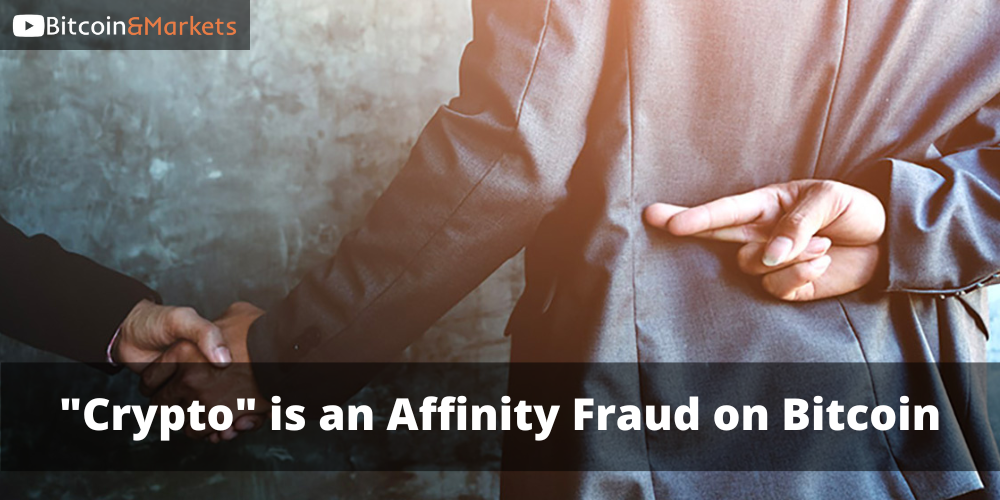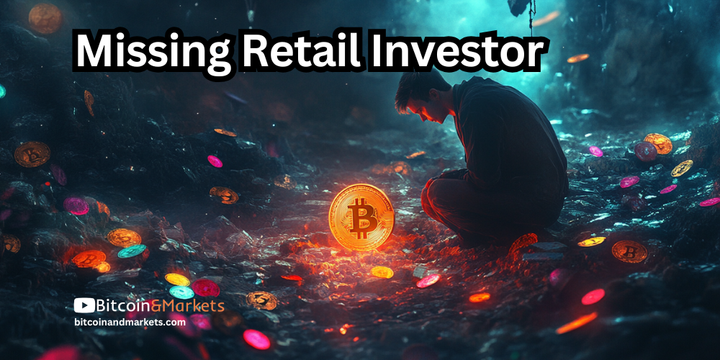"Crypto" is an Affinity Fraud on Bitcoin
The all-encompassing fraud in crypto is an affinity fraud on bitcoin. It is a category error to lump scams in with Bitcoin.

In a recent post, I defined Ponzi and Pyramid schemes to refute allegations made against Bitcoin by gold bugs and no-coiners. While these schemes are not applicable to Bitcoin, they are present on a spectrum in altcoins, aka crypto. In light of the recent crackdown on fraud in crypto, it is important to repeat what bitcoiners have been saying for 10 years now, that crypto is not Bitcoin, and Bitcoin is not crypto.
Fraud is rampant in altcoins with one all-encompassing fraud that serves as the foundation of the crypto space, enabling the entire spectrum of other scams to flourish.
In this post, I will define affinity fraud and explain why it's a necessary part of "Crypto", but not Bitcoin. In doing so, I cover the topic of category error, meaning much of this post is about that topic, as well. In the end, I hope to have convinced you that crypto cannot be anything other than a fraud and should not be in the same discussion with Bitcoin, except in the context of fraud, like phishing emails to marketing, or penny stocks to the Dow Jones Industrial Average.
Affinity Fraud
According to investor.gov:
Affinity frauds target members of identifiable groups, such as the elderly, or religious or ethnic communities. The fraudsters involved in affinity scams often are – or pretend to be – members of the group. They may enlist respected leaders from the group to spread the word about the scheme, convincing them it is legitimate and worthwhile. Many times, those leaders become unwitting victims of the fraud they helped to promote.
These scams exploit the trust and friendship that exists in groups of people. Because of the tight-knit structure of many groups, outsiders may not know about the affinity scam. Victims may try to work things out within the group rather than notify authorities or pursue legal remedies.
I'd add to the above definition, along with "trust and friendship" they exploit shared ignorance of a subject. Altcoin projects and promoters target the undiscerning public who have heard about Bitcoin but don't know enough to understand what it is. There are, at least, two parts of this target demographic.
First, those who are in it to reproduce the gains of bitcoin. They know nothing and care nothing about monetary economics or technical tradeoffs. These are people who partake in MLM scams and click on the ads promising, "make $1000 a day passive income online." Both proprietors and victims of MLM scams are in this cohort. Also represented here is the modern high-leverage YOLO speculator, symbolized by the Wall Street Bets subreddit.
The second, and more important group in the crypto target demographic is the naïve futurologists, those who think the future is just a series of linear problem solving on the path to utopia. To these folks, Bitcoin is the first iteration of its technology and, obviously, there will be better coins in the future. We might call them tech-progressives.
In the crypto affinity fraud, promoters and founders pretend to be a part of this tech-savvy idealist group in order to smuggle in unnecessary money printing schemes. They tell people Bitcoin is old tech and their new thing is like Bitcoin but better or solves some pain point Bitcoin cannot, you just have to get in now buying the tokens they are printing.
Altcoin projects and promoters use terminology like, "blockchain", "ledger", "decentralized" or "cryptocurrency", which almost no one understands. I wrote the Bitcoin Dictionary in part, to help combat the misuse of many of these terms.
There are two layers to the affinity fraud. Claims that altcoins are like Bitcoin, because of blockchain or cryptography or some other nebulous term, and the scammers themselves pretending to be utopian tech-progressives, when in fact, they just want to scam people.
Motivations are hard to prove. Scammers and fraudsters carefully built a category error to provide plausible deniability. They can claim their ditractors are toxic and biased, but the proof is in the pudding. Crypto projects have never delivered on their claims. All they've done is pump and dump. The whole crypto scheme relies on placing scam coins alongside Bitcoin in a false category. Once we break that fallacy, the scammers have nowhere to hide.
Category Mistake/Error
The crypto affinity fraud is enabled by the promotion of a category error.
...a logical fallacy that occurs when a speaker (knowingly or not) confuses the properties of the whole with the properties of a part. It contains the fallacy of composition (assuming the whole has the properties of the part) and the fallacy of division (assuming the part has the properties of the whole). - RationalWiki
A couple examples of a category error are as follows:
1) Birds can fly, so feathers, bones and muscles can fly. Technically, a fallacy of composition, deriving the properties of the parts from the properties of the whole. The reverse is also an error, assuming the bird cannot fly, because feathers, bones, and muscles individually cannot fly.
This is pervasive in crypto, e.g. "blockchain" (or any technology) makes Bitcoin valuable. Our project has a blockchain, therefore, it is also valuable. It completely disregards the extremely complex relationship between all Bitcoin's building blocks and reduces them to parts to imitate.
2) Any business is viable as long as it has a cafeteria, because Fortune 500 companies have cafeterias on their campuses. Here, you are taking a shared property and extrapolating a higher category. You are creating a category based on a shared characteristic that doesn't make sense.
"Things with a cafeteria" is a category we can make, but it is not a property of a what makes a company successful. It is laughable to say that because some company has a cafeteria, we should buy their stock and wait and see if they become successful. Yet, this is what we are asked to do with "blockchain" and "crypto". It's absurd.
We don't need to wait and see if a use case of blockchain is legitimate, if we understand what a blockchain is. Same with decentralization and cryptography. These are just buzzwords that very few people understand. But the scammers and fraudsters will argue that bitcoin is valuable, therefore, if something is like Bitcoin, we should give it time to develop. Suggest replacing that time with knowledge? Oh, you're a toxic maximalist.
"Category mistake" was coined in 1949 by Gilbert Ryle, when he pointed out an error in Cartesian mind-body dualism. Descartes claimed the mind and body were separate entities with a causal relationship (the standard in philosophy for 100's of years). Ryle asked, what is the nature of these causes? If they are mental, i.e. non-spatial, non-physical, then they can't move the body; if they are purely physical they can't be moved by the mind. Ryle made the claim that the mind is not in the same 'category' as the body, or more precisely that the mind was emergent from a certain collection of physical things, and therefore didn't belong in the category with those individual physical things.
Another example that Gilbert Ryle used is perfectly applicable to the crypto-Bitcoin category problem, that of a university. A person came to tour a university and was shown the library, buildings, cafeteria and dorms. At the end of the tour, the person asked when they would see the university.
Their mistake was lumping the university in with the category of the things that make up a university.
It is the unique combination of mission, faculty, and organization of the components that make an institution a university. It is not defined by having any particular attribute, like buildings, students, dorms, lawns, or a library, and especially not only one of those things.
Easy enough for tangible properties and well-known institutions, but the "crypto" category error is due to the use of terminology people do not understand. What is a "blockchain"? How and why do you maintain a distributed consensus? This is precisely why it seems plausible to lump altcoins in with Bitcoin and doesn't strike us immediately as absurd. Someone might say, "My project works because it has a blockchain like Bitcoin," which most people have no idea what that means, so the general public accepts it. However, if someone were to say, "My business idea will work because we have professional letterhead like a Goldman Sachs." You would instantly think that an absurd statement.
Bitcoin is like the University. It is a unique and complex balance of components and merely because a project shares one of those components, does not make it like Bitcoin, anymore than a place with a library makes it a viable University.
A rebuttal at this stage might be, "But there are many things that Solana and Bitcoin have in common, not just a blockchain; they have tokens, they are software protocols, etc."
A Ponzi scheme has investors, operating expenses, profit, a founder, perhaps employees, all things that a legitimate business has. However, they have obvious categorical differences between them. Just like Bitcoin and Solana have a blockchain, tokens, nodes, software, and developers, they have categorical differences between them. In the case of a Ponzi vs legit business, there is only one huge difference, the source of revenue and returns for investors; one is a sustainable, long-term wealth producing entity the other is not. Solana and Bitcoin have many more differences than a Ponzi and a legit business, they are decentralization, censorship resistance, distribution, robustness and independence of the code, goal, amongst others.
So, what is Bitcoin? It's not easy to list the necessary and sufficient components. Bitcoin is a collection of things, a protocol, nodes, proof-of-work, miners, mining equipment, a token, token holders, speculators, freedom advocates, different communities of programmers, sound money advocates, academics, economists, speculators, fierce but non-violent crypto-anarchists, etc etc etc. It is the free market around all these components. The defining factor is not "blockchain".
What is Crypto?
I searched for a definition of "crypto" but couldn't find a concise or comprehesive definition. Almost universally they are for "cryptocurrency". Here's a typical example:
"Cryptocurrencies are digital tokens that use cryptography for their creation and security. Bitcoin was the first, but thousands more have come." - Decrypt
Do you see the category error? Digital tokens that use cryptography does not describe Bitcoin, it describes necessary but not sufficient properties of Bitcoin. Those things without a fair launch, proof-of-work, censorship resistance, completely independent monetary policy, etc, wrongly claim kinship with Bitcoin.
"Digital tokens" using cryptography were around long before Bitcoin. The second half of the definition is also extremely problematic. What is meant by "creation and security"? Solely dependent on cryptography, a little input from the founding team, what? The sad fact is that almost no one can give a definition for crypto that matches with the range of products and services in the real world labeled as such.
Some examples: Ripple (XRP) was all minted prior to launch, so its "creation" did not use cryptography, and it is secured by a central party (yes, probably with passwords/keys, but is that what is meant?). Is Ripple part of "crypto"?
Ethereum had a "premine", too (coins created prior to launch and present in the genesis block). To this day, 60% of the ethereum supply - 72 million of the total 120 million - is from the initial premine. Ethereum's security is also not independent or solely reliant on cryptography. Famously, in the DAO hack, a central group of developers clawed back coins that were acquired using that cryptographically security. Is Ethereum part of "crypto"?
Passwords and secured hypertext (https) literally use cryptography and tokens. They existed long before Bitcoin. Are they part of "crypto"?
Non-fungible tokens (NFTs) use cryptography for their creation and security, but don't have a native blockchain per se, or network, or even a protocol. They also existed in a form before Bitcoin. Are they part of "crypto"?
Can you see the problem? Because these things involve a blockchain, use cryptography and tokens, they claim affiliation with and derivation from Bitcoin. Why claim this affinity to Bitcoin when all these things predate Bitcoin? Because Bitcoin has market value and they want to put themselves in that orbit. They want to claim affinity to Bitcoin.
I like this one from the New York Times:
These days, “crypto” usually refers to the entire universe of technologies that involve blockchains — the distributed ledger systems that power digital currencies like Bitcoin, but also serve as the base layer of technology for things like NFTs, web3 applications and DeFi trading protocols.
"The entire universe of technologies" is a good way to put it. Notice the reliance on Bitcoin once again. The rest of that definition is circular; crypto involves blockchains, used for digital currencies, NFTs, web3, defi, that are defined by their use of a blockchain. But what is that?? Oh, it's "like Bitcoin". The circularity only ends there. They do not have to go into any details because "like Bitcoin" is enough. What is blockchain? What do NFTs and DeFi have in common that make them "crypto"? The problem here is the category of "like Bitcoin" is completely fictitious, just like the category of "places with a cafeteria" do make then Universities.
Here is another definition from Coursera:
Cryptocurrency, or crypto, is a digital payment platform that eliminates the need to carry physical money. It exists only in digital form, and although people mainly use it for online transactions, you can make some physical purchases. Unlike traditional money printed only by the government, several companies sell cryptocurrency.
Cryptocurrencies are fungible, meaning the value remains the same when bought, sold, or traded. Cryptocurrency isn’t the same as non-fungible tokens (NFTs) with variable values. For example, one dollar in crypto will always be one dollar, whereas the value of one NFT dollar depends on the digital asset it’s attached to.
Finally, we get a definition without reference to Bitcoin, but that leaves them flapping in the wind and not making sense. Also, notice they are equating cryptocurrency with crypto, which is not what we find in reality. The first sentence calls it a platform, while the first sentence in the second paragraph refers to it as a token on a platform. You can see the conflation of a "universe of technologies" and the tokens.
Coursera also does not consider NFTs part of crypto, and they use some confusing example that doesn't make much sense to be honest. How many people would consider NFTs not part of crypto?
According to Coursera's definition, crypto fits perfectly into a category with other previously existing technology prior to Bitcoin. According to it, we could say crypto is derived from PayPal. PayPal uses crypto tokens in their secure messages, used for digital payments and some in physical transactions, and one dollar in PayPal dollars is always one dollar. In other words, Ethereum is like PayPal, not like Bitcoin according to Coursera. That probably doesn't work for most people in crypto.
I hope you can see the confusion in simply trying to define what crypto is without building a fraudulent category in order to stop circular reasoning. Therefore, the best and shortest definition of crypto is a claim to be "like Bitcoin".
Not Worthless, Fraudulent
Being in a fraudulent category doesn't necessarily make something worthless, and I do not say that altcoins are worthless. In the opening of this post I likened altcoins to phishing emails and penny stocks. These things are not worthless, they serve their purpose to profit from fraud.
Altcoins claim extraordinary valuations based on the false categorization of being like Bitcoin, they do not claim their valuations based on their individual or immutable characteristics as Bitcoin does. Ask a crypto bro, "why do you need a blockchain for that?" They'll dismiss you by calling you a maximalist. If they truly dig into it, considering all the ways crypto is centralized, unfinished and censorable, they'd have conclude that these projects are like any other centralized business, except that they claim affinity to Bitcoin.
Overcoming Affinity Fraud
I do not blame the victims of this affinity fraud. When you first come into the space, prior to knowing much about the technology and being exposed to the loudest influencers whom are almost universally promoting this fraud, the crypto category seems pretty straightforward and logical. When I came into the space, I learned a cursory amount about how distributed consensus works and my imagination flew to different ways to use the technology.
The fraud is purposefully enhancing that initial misunderstanding as a way to get people into the myriad of schemes described above. Instead of promoting education, they promote ICOs or tokens. The education that is promoted by these people is selling a dream, not cold hard economics - I'm specifically thinking about Coinbase's educational videos here. "Crypto" is a reinforced category error used to hide the obvious scam-like nature of altcoins. One way we know this is happening is because people tend to lean more toward bitcoin maximalism the longer they are exposed to the space (unless they make money off the scams before they blow up).
The good news is, if left to our own devises, many people will escape the affinity fraud with enough time. Unfortunately, that also involves learning through pain and financial loss. After a few years of being interested in the space, you will experience a market cycle of failed crypto promises from altcoin promoters. You will realize that they are not "one of us" and instead they are running a scam. We learn through experience that Bitcoin is unique, and the category error starts to sink in.
This works for 50% or more of people in my experience, however, some people are so bought into their illusion that they will go down with the ship. It's a beautiful property of the market that people who get wrecked also lower the influence of their opinions/promotion. IOW category error cannot be as easily promulgated through failure.
Then there are the scammers themselves, the altcoin promoters, who understand they are running a scheme. We can spot these people quite easily. They are the ones who, after several cycles of promoting this fraud and their followers getting wrecked, they are still relatively wealthy and influential. They also distain and fight open debate with people trying to break the fraud, often calling them toxic, close-minded or shaming them for not being "inclusive". We really cannot do anything in their case, other than not be surprised when they run afoul of the authorities or, and I do not support this, a victim of their scam.
Another great natural defense is the natural shrinking of the pool of the most vulnerable and gullible targets of this fraud, similar to diminishing marginal returns. Each cycle there will be fewer in the target audience that have not gone bankrupt in the prior cycle. Eventually, the whole affinity fraud/category error itself will run out of people in the target demographic. That's when they slightly change the marketing to perhaps get the same suckers to invest a second time.
A third natural defense is the evangelist zeal many get after being burned by crypto scams. Just like when we find Bitcoin for the first time and we want to tell everyone about it, these people will naturally want become activists against altcoins.
So, there are three natural forces helping us fight this fraud: 1) getting burned yourself lowers your ability to get back in on the next cycle and lowers your influence, 2) the potential target market that hasn't been victim of the scams gets smaller each cycle, and 3) once you've been burned you want to tell everyone about it.
What can bitcoiners do?
Drive home the fact that Bitcoin is not "crypto". This is a fake category used to hide obvious malicious behavior. Just because it uses a blockchain does not make it "like Bitcoin" any more than a building with a bathroom is "like a University".
Be able to briefly explain why the parts of Bitcoin cannot be separated. The pieces all rely on each other. If it doesn't have everything together, it's just another app lying about affinity with Bitcoin. Bitcoin's censorship resistance comes from decentralization, which is enabled by a fair launch and proof-of-work, which is incentivized by a block reward in a native asset, that is used in censorship resistant transactions.
- A new money, requiring
- Robust monetary properties, requiring
- Decentralization, requiring
- Distributed consensus, requiring
- Block chain, requiring
- Non-gameable appending of transactions, requiring
- A block reward, requiring a new money
The parts build on each other, are dependent on each other, and circular, but only make sense for the goal of mitigating reliance on a central party. It's holistic and cannot be diminished to one technology.
At the most fundamental level, the property that makes bitcoin unique is the lack of central party (or a Trusted Third-Party (TTP) in bitcoin jargon). It's not digital tokens, blockchain, or cryptography that are new and define Bitcoin's category, it is the complete and complex structure of bitcoin that enables it to have no central party.
All altcoin promises can be done more efficiently without the pretense to decentralization. Ask very basic questions and press them:
- Why do you need a blockchain?
- What benefit outweighs the massive cost of decentralization?
- Why can't this be done centralized?
- Who is trying to censor these type of transactions?
- Why do you need a seperate token instead of using Layer 2 Bitcoin?
- Who got the premine, and why won't they dump on you?
- Do you depend on a group of people/devs for future promised upgrades?
These are just a few I came up with in several minutes. I'm sure you can think of many more. I suggest making a list in a doc that you can reference or even email to people. This will likely convey a knowledge level, that you have a list like this ready to go. It will also expose them to some of basic research questions they can pursue on their own if they are truly interested. If they are not, at least you know their intentions.




